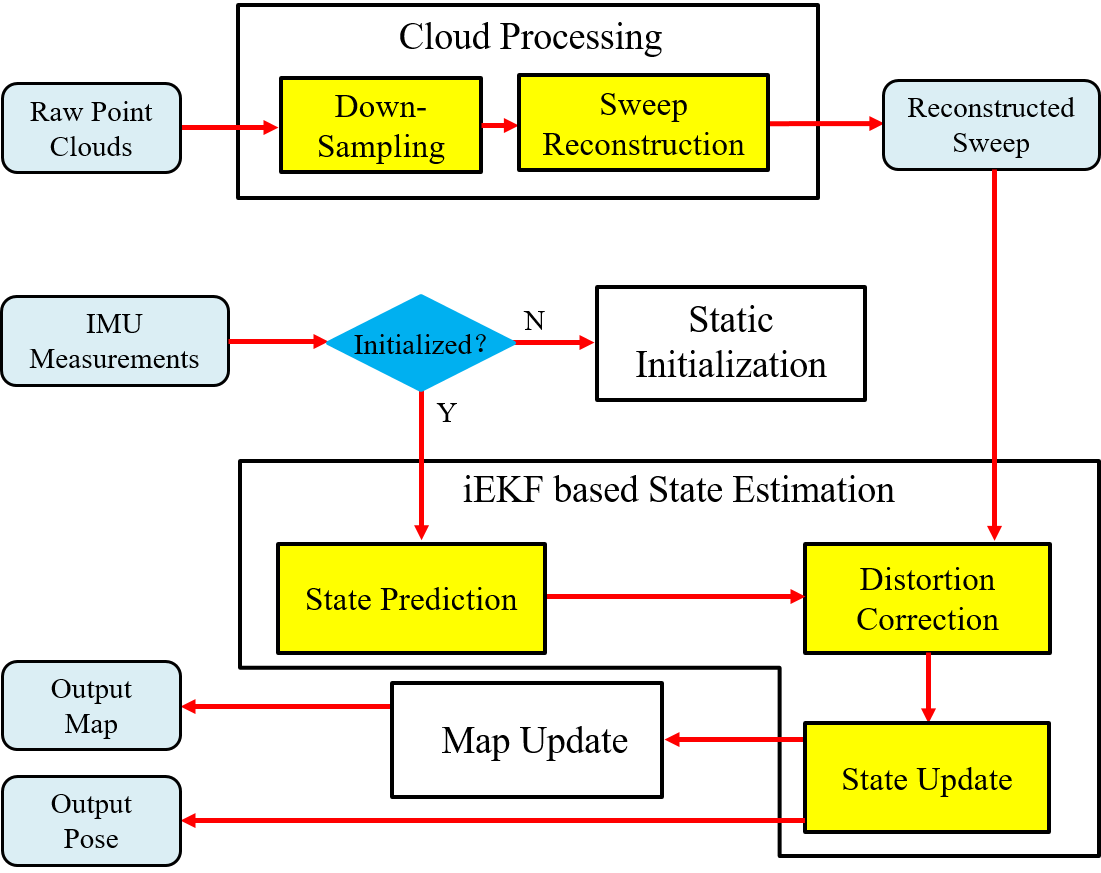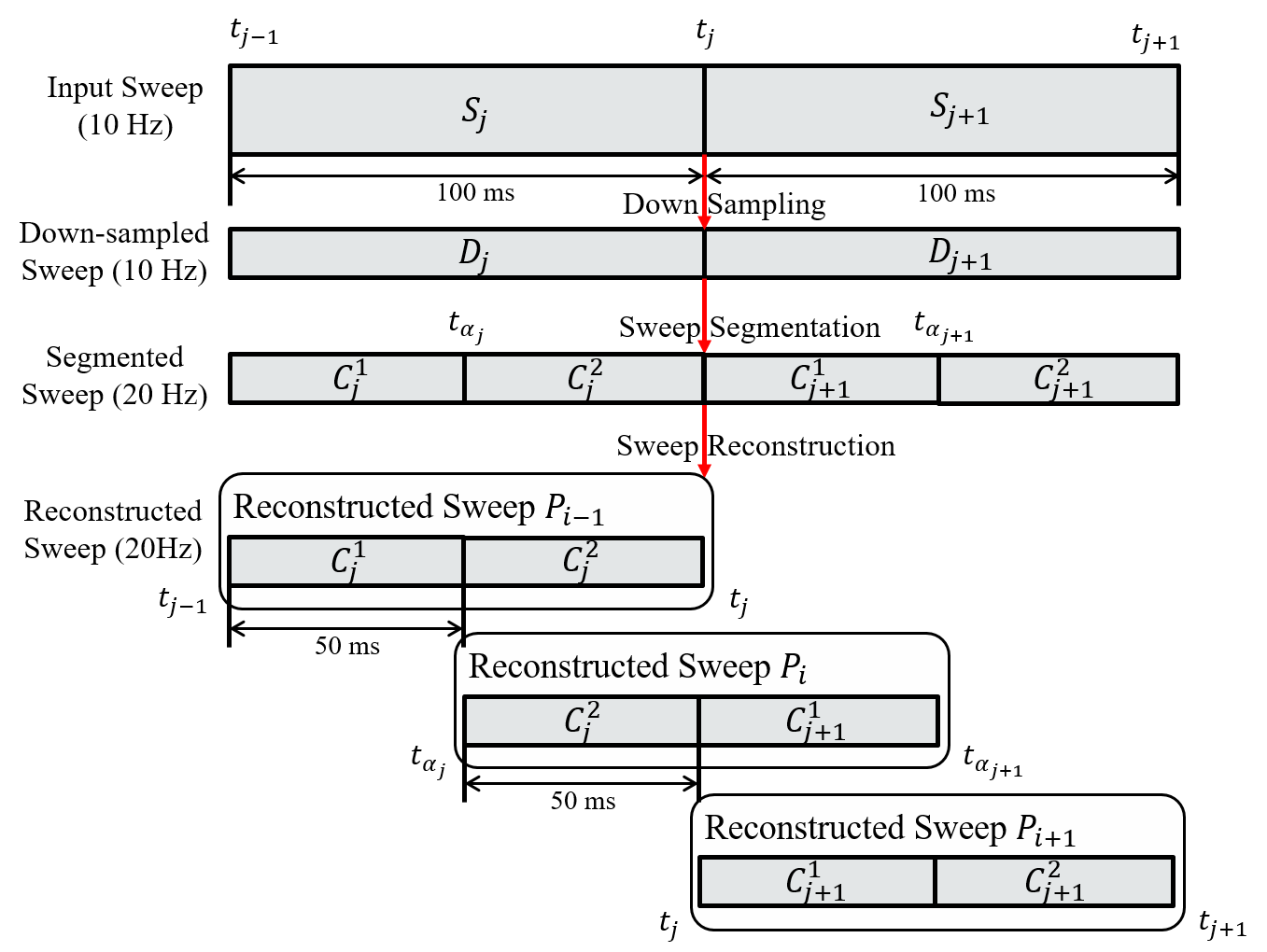SR-LIO (LiDAR-Inertial Odometry with Sweep Reconstruction) is an accurate and robust iterated extended Kalman filter (iEKF) based LiDAR-inertial odometry (LIO) that can increase the execution frequency beyond the sweep frequency. It segments and reconstructs raw input sweeps from spinning LiDAR to obtain reconstructed sweeps with higher frequency. Such method can reduce the accumulative error of predicted state by reducing the time interval of IMU measurements integration for iEKF based LIO systems by using highfrequent reconstructed sweeps and in turn achieve more accurate and robust state estimation results.
SR-LIO: LiDAR-Inertial Odometry with Sweep Reconstruction
Authors: Zikang Yuan, Fengtian Lang, Tianle Xu and Xin Yang
Pipeline:
New Features:
- The proposed Sweep Reconstruction module splits the original sweep packet into continuous point cloud data streams, and then re-packages point cloud data streams in a multiplexing way to obtain sweeps with higher frequency, which is illustrated by the figure as follow:
- Sweep Reconstruction can effectively reduce the accumulative error of predicted state by reducing the time interval of IMU measurements integration for iEKF based LIO systems by using highfrequent reconstructed sweeps and in turn achieve more accurate and robust state estimation results.
- SR-LIO proposes Performing distortion correction for each segment to prevent inaccurate trajectory caused by multiple inconsistent distortion correction to a particular point.
GCC >= 5.4.0
Cmake >= 3.0.2
Eigen3 >= 3.2.8
PCL == 1.7 for Ubuntu 16.04, and == 1.8 for Ubuntu 18.04
Ceres >= 1.14
| OS | GCC | Cmake | Eigen3 | PCL | Ceres |
|---|---|---|---|---|---|
| Ubuntu 16.04 | 5.4.0 | 3.16.0 | 3.2.8 | 1.7 | 1.14 |
| Ubuntu 18.04 | 7.5.0 | 3.11.2 | 3.3.4 | 1.8 | 1.14 |
mkdir -p ~/SR-LIO/src
cd SR-LIO/srcgit clone https://github.com/ZikangYuan/sr_lio.git
cd ..
catkin_makeNoted:
A. Except fot the external parameters between IMU and LiDAR, and the value of gravitational acceleration, the parameter configurations used in different datasets are exactly the same to demonstrate the stability and robustness of SR-LIO.
B. Please make sure the LiDAR point clouds have the "ring" channel information.
C. The warning message "Failed to find match for field 'time'." doesn't matter. It can be ignored.
D. Please create a folder named "output" before running. When SR-LIO is running, the estimated pose is recorded in real time in the pose.txt located in the output folder.
E. If you want to get some visualization of the split and recombine, please set the debug_output parameter in the launch file to 1 (true). After that, you can get some .pcd files in "output/cloud_frame" and "output/cut_sweep" folders.
F. As the groundtruth acquisition of some datasets (UTBM and ULHK) are extremely complicated, in order to facilitate evaluation, we store the pose ground truth of the three datasets used by us as TUM format. Please down load from Google drive.
1. Run on NCLT
The time for finishing a sweep by the LiDAR of NCLT is not 100ms, but 130~140ms (around 7.5 Hz). Therefore, we need to package the data stream of the NCLT dataset as 7.5 Hz sweep packages. The nclt_to_rosbag.py in the "tools" folder can be used to package 7.5 Hz sweeps and linearly interpolated 100 Hz IMU data into a rosbag file:
python3 nclt_to_rosbag.py PATH_OF_NVLT_SEQUENCE_FOLDER PATH_OF_OUTPUT_BAGThen, please go to the workspace of SR-LIO and type:
cd SR-LIO
source devel/setup.bash
roslaunch sr_lio lio_nclt.launchThen open the terminal in the path of the bag file, and type:
rosbag play SEQUENCE_NAME.bag --clock -d 1.02. Run on UTBM
Before evaluating on UTBM dataset, a dependency needs to be installed. If your OS are Ubuntu 16.04, please type:
sudo apt-get install ros-kinetic-velodyne If your OS are Ubuntu 18.04, please type:
sudo apt-get install ros-melodic-velodyne Then open the terminal in the path of SR-LIO, and type:
source devel/setup.bash
roslaunch sr_lio lio_utbm.launchThen open the terminal in the path of the bag file, and type:
rosbag play SEQUENCE_NAME.bag --clock -d 1.03. Run on ULHK
For sequence HK-Data-2019-01-17 and HK-Data-2019-03-17, the imu data does not include the gravity acceleration component, and the topic of LiDAR point cloud data is /velodyne_points_0. For other sequences of ULHK used by us, the imu data includes the gravity acceleration component, and the topic of LiDAR point cloud data is /velodyne_points. Therefore, we provide two launch files for the ULHK dataset.
If you test SR-LIO on HK-Data-2019-01-17 or HK-Data-2019-03-17, please type:
source devel/setup.bash
roslaunch sr_lio lio_ulhk1.launchIf you test SR-LIO on HK-Data-2019-03-16-1, HK-Data-2019-04-26-1 or HK-Data-2019-04-26-2, please type:
sourcr devel/setup.bash
roslaunch sr_lio lio_ulhk2.launchThen open the terminal in the path of the bag file, and type:
rosbag play SEQUENCE_NAME.bag --clock -d 1.04. Run on KAIST
For point clouds, we utilize the data from both two 3D LiDARs of KAIST. Users can package the rosbag according to the tool kaist2bag. The partial test sequences of KAIST used by us can also be downloaded from Google drive.
Chinese users can download the test sequences of KAIST form baidu yun, while the password is s4bw.
Please go to the workspace of SR-LIO and type:
source devel/setup.bash
roslaunch sr_lio lio_kaist.launchThen open the terminal in the path of the bag file, and type:
rosbag play SEQUENCE_NAME.bag --clock -d 1.0If you use our work in your research project, please consider citing:
@article{yuan2022sr,
title={SR-LIO: LiDAR-Inertial Odometry with Sweep Reconstruction},
author={Yuan, Zikang and Lang, Fengtian and Yang, Xin},
journal={arXiv preprint arXiv:2210.10424},
year={2022}
}

